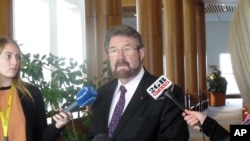Australia is insisting that new child protection laws are “the greatest crackdown on pedophiles in a generation”. Canberra says the measures will include longer prison terms for child abusers.
Australian officials say punishments handed down to pedophiles have been too lax. The government wants them to spend more time behind bars for their crimes, and plans to bring in mandatory minimum sentences for convicted child sex offenders. They would be similar to the automatic prison terms given to terrorists and people smugglers.
Officials say the new measures will properly reflect the disgust the community has at those who prey on children.
Australian Justice minister Michael Keenan says the current laws are not strict enough.
“I do not think it is as tough as the Australian people assume that it should be," said Keenan. "Now, we have found that less than 60 per cent of people who were convicted of Commonwealth (federal) child sex offences actually served time in prison and of those that do go to prison, the most common length of time that they serve is just six months. I do not think the Australian people would think that is acceptable and that is why we are very keen to change it to make sure that they serve a mandatory minimum time when they commit these horrendous offences against children.”
The legislation will make it more difficult for child sex offenders in Australia to be granted bail and parole.
There will also be tougher measures to crack down on online grooming, which will allow Australian police to intervene sooner if a suspect is found to be contacting a child with the intention of carrying out a crime.
Internet companies which do not immediately report abusive content to the authorities will face tougher fines.
In June, Australia passed new laws to stop convicted pedophiles from travelling overseas on so-called “child rape holidays” The measures gave officials the power to strip pedophiles of their passports.
Later this year, Australia’s most comprehensive inquiry into child abuse is expected to publish its findings into the widespread mistreatment of children in institutions, including Church groups, sporting clubs, schools and the military. The Royal Commission began hearing evidence from survivors of abuse in 2013.




